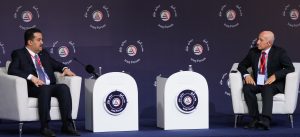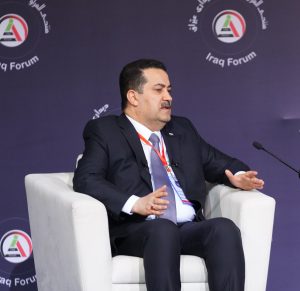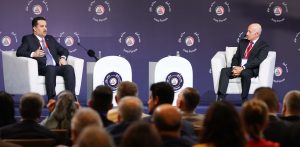- Mohammed Shia Al-Sudani, Prime Minister of Iraq
- Dlawer Ala’Aldeen, President of MERI (Moderator)
The Iraq Forum was held six months after the inauguration of the government of Prime Minister Mohammed Shia Al-Sudani, who faces high expectations and understandable pressure to tackle the multi-layered challenges that Iraq has been facing for some time, and was engaged in a policy debate by the President of MERI, Dlawer Ala’Aldeen, at the Iraq Forum.
“The government has had to confront various challenges in public service, living standards, and economic growth,” Prime Minister Mohammed Shia Al-Sudani told the audience. “However, perhaps the biggest obstacle it has faced is the prevalence of prejudices within and outside the country. Despite these challenges, the government has made significant progress within just six months, effectively disproving the validity of these biases.”

“They [the public] need to know that they have a serious government that delivers on its promises,” the Prime Minister said. “I was hoping for a more active role for some of the political entities, but we are overcoming these challenges,” he continued. “I wanted clarity from the very start and this is ongoing. Out of 80 commitments [laid out in the Government’s Programme as part of the government’s responsibilities], I have delivered on 31% of them,” he said. “Director Generals are important for the function of ministries. Some of the Director Generals were imposed on the government. We now assess their performance,” the Prime Minister continued. “Six months is adequate to evaluate the Deputy Ministers, Advisors, and Governors, after which we can assess the Ministers.”
Turning the focus to corruption, the Prime Minister admitted “it is not easy to expose with quick and easy procedures,” but that his government is “fully committed to combating corruption and will not hesitate to target those involved,” he said. “We have taken steps to initiate changes and appoint new individuals who are better suited for this task…We have teams that diligently pursue any suspicions of corruption within state institutions. Such suspicions or actual violations will be thoroughly investigated using professional and legal protocols,” he said. “Our top priority is to recover the stolen funds and bring the wanted individuals to justice,” the prime minister continued. “Corrupt individuals tend to flee the country and use the stolen money to purchase real estate or open bank accounts in neighbouring countries… We have international anti-corruption agreements in place, and the Central Bank of Iraq has been granted the authority to enforce compliance from financial institutions and ensure their cooperation.”
The prime minister also handed the ball back to Turkey in regards to when exports of Iraqi crude oil will resume, after it was halted as a result of the International Chamber of Commerce ruling earlier this year in Paris, hinting that the Baghdad-Erbil agreement is not behind the restart delay. “Why [wait] two weeks? If the Turkish side approaches us today, we resume exports,” the prime minister said. “The remaining issues are connected to the technicalities, such as the bank accounts, and the Turkish side… Turkey has officially informed us that they need to inspect the pipeline due to concerns that it might need rehabilitation following the recent earthquake… The delay is not a result of the lack of agreement, we wait as to when the pipeline is ready to resume exports,” he added.

According to Al-Sudani, improving the country’s energy sector has been one of the main priorities of his cabinet, and recent agreements signed with international firms will assist the country in its mission to end its import of gas. “We have signed for the first-time five-year maintenance contracts for the electrical sector, resulting in a 30% cost reduction for Siemens power plants, which account for 45% of our total power plant operations,” he told the audience. “We initially had concerns about the contracts with TotalEnergies. However, those reservations were addressed, and we have signed an agreement to provide up to 600 cubic metres of associated gas within the next 3-5 years,” the Prime Minister said.
The Prime Minister reaffirmed his commitment to achieving gas self-sufficiency and ending Iraq’s reliance on imported gas. “We are burning money every day when we flare gas,” he said. “We import gas from Iran worth $4 billion per year.” The recent deal with TotalEnergies will mean that Iraq will be able to produce 600 cubic metres on a daily basis, and the Basra Gas Company is expected to provide the country with 400 cubic metres of gas on a daily basis, “which means in one to three years we will bring an end to the import of gas,” Al-Sudani said. “We flare 1,200 cubic metres of associated gas daily and import 1,000 cubic metres, costing us $4 billion annually.
Partnering with TotalEnergies for 600 cubic metres will help compensate for consumption… within the next 15 months, one field in the fifth licensing round is expected to yield 255 cubic metres of gas… We are getting ready to commence the sixth licensing round, which will comprise new fields in the deserts of Anbar and Najaf that have recently been discovered,” he added. “It is essential for Iraq to have a presence in the gas market, as this is its rightful place. This can be seen from the vast reserves it possesses and also when considering the amount of gas that is being wasted through flaring.”
The Prime Minister also praised the role of Kurdistan Region President Nechirvan Barzani in achieving the deal between Baghdad and Erbil to resume the export of oil from the Kurdistan Region. He also stressed his own commitment to maintaining the payment of salaries to employees in the Kurdistan Region. “The relationship between the Kurdistan Regional Government and the Federal Government is a priority… There will be no delays in paying the salaries of those in the Kurdistan Region of Iraq, they are the same citizens as in Baghdad,” he said, calling the payment of salaries the responsibility of the federal government. “The leaders of the Kurdistan Region of Iraq are expected to participate in national affairs and not just focus on Regional matters. I sensed this attitude in the President of the Kurdistan Region of Iraq, who demonstrated a willingness to contribute,” he added.
Questioned by Dlawer Ala’Aldeen about the role of Iran and pro-Iranian armed non-state actors, Prime Minister Al-Sudani said: “When it comes to Iran, we have had nothing but support from Iran on official and unofficial relations ….. We have many commonalities with Iran. Iran stood with us against the former regime and the fight against ISIS,”. “Iraq will resolve some of its security complications after the recent Iran and Saudi detente.”

Turning the conversation to Iraq’s humanitarian situation, “A fund of 50 billion dinars will provide reconstruction in Sinjar, and remove security actors aside from the Iraqi army,” Al-Sudani promised the audience. “All parties of the government coalition agree that military groups should be under the control of the state.”
Regarding Iraq’s relationship with the United States, the Prime Minister affirmed that “the relationship between the two countries is really strategic and there is a strategic agreement between them. The United States supported Iraq in regime change and the war on terrorism, and there are common interests. We are interested in strengthening this relationship and activating all the files contained in the framework agreement.” … “It is time for us to implement this agreement, and not to limit cooperation and relationship only to the security aspect. The Iraqi people must feel the presence of advanced American companies in many fields…. We are serious about developing this relationship and putting it in its correct form. We do not wish to engage one party in an axis against another, and we do not want to be part of the policy of settling scores, nor the Iraqi land as an arena for settling scores.”
Iraq Forum: For Stability and Prosperity
4/05/2023
Session 11: Iraq’s Immediate Policy Priorities and the Challenges ahead.
Session video

